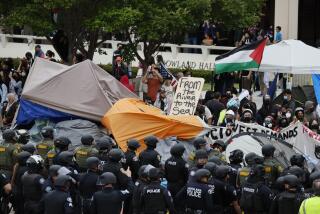UC Recruiters Look to Churches
When the University of California eliminated race and ethnicity as considerations in admission several years ago, some black pastors preached from the pulpit against the prestigious college system.
Now, a UC official is asking those same pastors, and other religious leaders, for help.
Jacqueline Mimms, the university’s assistant vice president of school-university partnerships, is hoping community groups such as faith-based organizations will help the university recruit more low-income students, many of whom are minorities.
Because many students and parents work, they can’t attend the usual outreach meetings at K-12 schools, Mimms said. Others don’t feel comfortable at the events. It might be more effective to offer application guidance and access to online college preparatory courses at churches, mosques, temples or synagogues, Mimms said.
The idea, still in its infancy, must be approved by either the UC president’s office or the Board of Regents, depending on how it is funded. Because Gov. Gray Davis cut UC outreach funds in his latest budget, the university will need eight to 12 months to determine whether it can afford such a collaboration.
But religious leaders already are intrigued. The Rev. Mark Whitlock, a onetime critic of UC and the president of a Southern California group that represents more than 600 black, Latino and Asian churches, met with Mimms a month ago. He said after the university eliminated affirmative action, some students felt “unwanted.”
If UC officials used religious institutions to woo underrepresented minorities (meaning Latino, African American and Native American students, who make up 19% of students admitted), they might feel more welcome, Whitlock said.
In April, the university announced that the number of underrepresented minorities admitted to its campuses had rebounded to levels seen before the affirmative action ban took effect in 1998--at every campus, that is, except UC Berkeley and UCLA.
Rising numbers or not, Whitlock said, some students still need encouragement.
The collaboration with religious groups would be a new recruiting strategy for the UC system. But as far back as 1987, the California State University system did something similar by working with the Roman Catholic Archdiocese of Los Angeles to recruit Latinos, said Cheryl Fields, spokeswoman for the National Assn. of State Universities and Land Grant Colleges.
On their own, faith-based institutions have groomed students for college for some time.
Lesean Tarkington, 22, grew up as a member of South Los Angeles’ First AME congregation and participated in a college preparatory program there. Early on, he learned how to handle a college application and interview.
Three years ago, Tarkington was accepted by both UC Berkeley and UC Davis, but he chose to attend Wilberforce University in Ohio. He felt the oldest private black college in the country would provide a more comfortable environment.
More students in his position might choose the University of California if it joined forces with religious groups, he said. “They’d think, ‘Let me see if I can give it a shot.’ ”
The religious groups are ready and waiting, said Bob Jackson, pastor of Acts Full Gospel Church of God in Christ in Oakland, which hosted a black education summit at which Mimms spoke in February. “All we need are the people with the knowledge to bring it back and share it with the people who don’t have it,” Jackson said.
UC Regent Ward Connerly, who led the successful effort to pass Proposition 209, the 1996 initiative ending affirmative action in state admissions and hiring, said he supports the idea as long as it focuses on attracting the “broadest segment of people possible.” If the university system targeted only students of a specific race, it would directly violate Proposition 209, he said.
Civil libertarians say they don’t object to the alliance because the university doesn’t plan on championing a specific religion or directing funds to faith-based institutions. “It should be fine as long as no proselytizing takes place,” said Ramona Ripston, executive director of the American Civil Liberties Union of Southern California.
In the meantime, a San Francisco-based public policy and advocacy group wants to pilot a similar plan on a smaller scale.
The Greenlining Institute, which has a partnership with UC, wants to funnel college prep resources into three Los Angeles-area churches by the beginning of the school year.
Whitlock hopes the UC system learns from that program and begins its own expanded version without delay. “I support research,” he said. “But we need people graduating now.”
More to Read
Sign up for Essential California
The most important California stories and recommendations in your inbox every morning.
You may occasionally receive promotional content from the Los Angeles Times.










